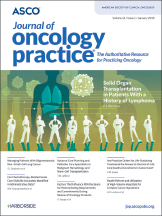
Survival of patients with Hodgkin and non-Hodgkin lymphomas is increasing, and with that comes the need, in some cases, for solid organ transplantation, often because of treatment-related toxicity. The factors involved in organ transplant among lymphoma survivors were discussed by Philip J. Bierman, MD, Professor of Medicine at the University of Nebraska Medical Center, in the Journal of Oncology Practice (JOP).1 Dr. Bierman shared some thoughts on this topic in an interview with The ASCO Post.
Transplant in Lymphoma Survivors
Is transplant in patients with a history of lymphoma an area of particular interest to you?
Patients with a history of lymphoma constitute about 90% of my practice. For some reason, I see a large number of them who need organ transplants, referred for evaluation by surgeons. It’s ultimately not my decision, but I’m definitely an advocate for these patients. I want to see them get their organ, if at all possible.
It’s especially unfortunate when the need for transplant is due to a complication of lymphoma therapy, typically anthracycline-induced cardiomyopathy. But for most patients, the reasons are the same as for those without a history of lymphoma—for example, kidney failure arising from hypertension.
Is there a typical situation or common scenario?
The most common scenario is a patient who has been treated in the past for Hodgkin lymphoma or non-Hodgkin lymphoma, has been in remission for some time, and now needs a transplant for some reason that is often

Philip J. Bierman, MD
unrelated to the cancer. When all the other factors look okay, the decision to move forward with transplant is pretty easy. It’s more difficult when the patient has been in remission for a shorter interval or is unlikely to stay in remission. The really difficult cases are those patients with follicular lymphoma, because they may be especially likely to have a recurrence. We have very little information about transplant in this subgroup. In my practice, though, we’ve had a patient with follicular lymphoma who received an organ transplant several years after his treatment and is doing well 3 years later.
Contraindications to Transplantation
What then are the absolute contraindications to transplantation in lymphoma survivors?
They are the same as for other individuals without lymphoma, such as advanced age and comorbidities. From a lymphoma standpoint, active disease is generally a contraindication.
The fundamental issues involved in making a recommendation are related to the prognosis of the patient with and without the transplant and the justification for providing an organ to a patient with a prognosis that may be worse than that of other potential recipients. We are all trying to be good stewards. Organs are a scarce commodity, and ideally they should be used in those with the best chance of a successful outcome. But lymphoma survivors do receive transplants, and they can do very well.
Long-Term Survival and Recurrence
What are the statistics for survival after solid organ transplant in persons with a hiustory of lymphoma?
There are a few studies that have reported these outcomes. In the Israel Penn International Transplant Tumor Registry of 91 lymphoma patients who underwent heart, lung, liver, or kidney transplantation, the 5-year overall survival after transplantation was 68% for the Hodgkin lymphoma group and 85% for the non-Hodgkin group.2 And in another study of 34 patients from various transplant centers who received a heart transplant at a median of 10 years after lymphoma treatment, the 10-year actuarial survival was 50%.3
Does organ transplantation increase the risk for cancer recurrence or impede further treatment that might be necessary should the lymphoma recur?
There’s a theoretical potential for this scenario. The concern is that the immunosuppressive drugs the patient needs after transplant could increase the risk of cancer recurrence, and this is a consideration in making the decision for a transplant.
Guideline Recommendations
Are the guidelines consistent in their recommendations about transplant in patients with a history of lymphoma, and is there a set of guidelines you prefer?
Some of the guidelines (listed in Table 2 in my JOP article) were specific for lymphoma, and some were general guidelines for all malignancies. None of the guidelines distinguished between Hodgkin and non-Hodgkin lymphoma, and none made specific recommendations regarding subtypes of non-Hodgkin lymphoma. They are consistent in recommending that clinicians be circumspect about making this decision—careful thought is required when considering transplant in cancer survivors.
ISHLT GUIDELINES FOR SOLID ORGAN TRANSPLANT IN PATIENTS WITH A LYMPHOMA HISTORY
Lung
- A 5-year disease-free interval is prudent in most cases, particularly for patients with a history of hematologic malignancy.*
Heart
- Collaboration with oncology specialists should occur to stratify patients as to their risk of tumor recurrence.
- Transplantation should be considered when tumor recurrence is low based on tumor type, response to therapy, and negative metastatic workup.
- The specific amount of time to wait for transplantation after neoplasm remission will depend on the aforementioned factors, and no arbitrary time period
for observation should be used.*
*Guideline is not specific for lymphoma.
ISHLT = International Society for Heart and Lung Transplantation.
Information from Bierman.1
Most authorities recommend a 2- to 5-year waiting period after treatment, based on the fact that most recurrences occur within this period. However, a requirement for a longer period of remission may not lead to improved overall survival and, in fact, may result in higher rates of noncancer mortality.
I personally like the guideline by the International Society for Heart and Lung Transplantation, which says there is no specific waiting time or arbitrary period before a transplant can be considered; each situation needs to be assessed individually.
Message to Oncologists
What is your message to oncologists who are caring for such a patient?
I would emphasize that a history of lymphoma is not a contraindication to organ transplant. These patients can do well. A careful, multidisciplinary evaluation is needed to determine whether an individual patient can get to transplant. I think the information in my article provides many references to help clinicians think through this process. ■
DISCLOSURE: Dr. Bierman reported no conflicts of interest.
REFERENCES
1. Bierman PJ: J Oncol Pract 14:11-17, 2018.

